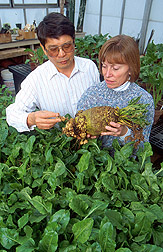|

Geneticist Ming Yu and technician Linda Pakish examine a sugar beet damaged by root-knot nematodes. Click the image for more information about it.
|
New Sugar Beets Fend Off Worm Attackers
By Marcia Wood
August 17, 2000
Notorious worms called root-knot nematodes fail in their attacks on a new breeding line of nematode-resistant sugar beets from Agricultural Research Service plant breeders. What's more, the gene or genes that help these new sugar beets thwart the microscopic, soil-dwelling worms may possibly be moved into other kinds of plants—including peaches, nectarines, potatoes or tomatoes—that are otherwise vulnerable to nematode forays.
Besides reducing the quality and quantity of a harvest, hungry root-knot nematodes can create an entryway for root rots, according to ARS geneticist Ming H. Yu at Salinas, Calif. Yu developed the new M6-1 line of sugar beets and offered them to plant breeders and researchers for the first time this year. He is with the ARS Crop Improvement and Production Research Unit.
In Yu's greenhouse tests, the M6-1 sugar beets suffered little if any damage when exposed to six different species of Meloidogyne nematodes. These species make up 98 percent of the root-knot nematodes in the world's agricultural soils. The M6-1 sugar beets apparently are the first plants known to be resistant to all six of these nematode species.
A relative of Swiss chard, sugar beets are a natural source of high-quality sugar, a nutritious feed ingredient for cattle and sheep, and a source of raw materials for making yeast, chemicals and pharmaceuticals. Some backyard gardeners raise sugar beets for leafy greens.
The California Beet Growers Association, Ltd., in Stockton, Calif., helped fund Yu's experiments. An article in the August 2000 issue of ARS' Agricultural Research magazine tells more about Yu's studies and also highlights ARS sugar beet work in Colorado, Michigan and North Dakota. The article is also on the web.
Scientific contact: Ming H. Yu, ARS Crop Improvement and Production Research Unit, Salinas, Calif., phone (831) 755-2845, fax (831) 755-2814, myu@salinas.ars.usda.gov.
|

